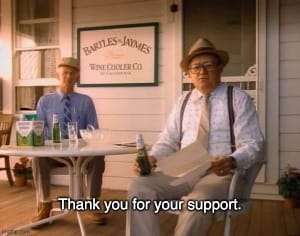A new year's message from Jimmy Carter
"The combined wisdom and courage and commitment and discernment and unselfishness and compassion and love and idealism of the common ordinary people."

Forty years ago this past spring, Jimmy Carter addressed guests at the University of Georgia School of Law's annual Law Day luncheon. At the time, Carter was governor of the state, where he'd been born and lived most of his life. Two and half years later, he'd be elected president, and the Law Day speech was part of that.
See, Rolling Stone reporter Hunter S. Thompson was present for it, to cover the main speaker of the day: Senator Ted Kennedy of Massachusetts. Kennedy—the younger brother of John F. and Robert F.—was expected to be the Democratic nominee in the 1976 presidential election, and had spoken to a larger audience two hours earlier. By the time of the luncheon, Thompson was getting tipsy on Wild Turkey and not fully paying attention to Carter.
But three and a half minutes into Carter's speech—which he'd rewritten on the fly after hearing Kennedy's, because they overlapped too much—the governor identified the two main sources of "my understanding about what's right and wrong in this society": theologian Reinhold Niebuhr and "a friend of mine, a poet named Bob Dylan." When Carter mentioned Dylan, Thompson raced out to his car to grab his tape recorder, and rushed back in for the rest of what he later called
the heaviest and most eloquent thing I have ever heard from the mouth of a politician. It was the voice of an angry agrarian populist, extremely precise in its judgments and laced with some of the most original, brilliant and occasionally bizarre political metaphors anybody in that room will ever be likely to hear.
And Hunter S. Thompson sat through more political speeches than most of us can imagine. He played the audio recording for other reporters over and over again; a friend made dubs of it to give out to journalists. Though his Rolling Stone story didn't run until June 1976, Thompson's evangelism got his colleagues in the media interested in Carter, which in turn helped make him the Democrats' eventual candidate, who would defeat Republican incumbent Gerald Ford.
Ford, of course, had actually been elected vice president as Richard Nixon's running mate, and finished out Nixon's second term after the disgraced 37th president resigned in August 1974. When Carter gave his Law Day speech on May 4, Nixon's White House had released edited transcripts of the tape recordings that would end his presidency less than a week earlier.
This is relevant. A really good history of the speech at Law.com notes that "Law Day speakers typically praise the legal system and those who administer it." With the unraveling Watergate scandal looming over the country, "Carter turned that convention on its head." He called out lawyers, judges, and the legal industry for doing too little to promote and preserve justice in America. He was polite about it, even funny at times, but he called them out. He compares lawyers to nuclear physicists and farmers (Carter was both), and notes that in those professions, it's standard practice to work toward change for the better. He doesn't see lawyers doing that, he says. He cites specific flaws in the system, specific injustices that no reasonable person would go on record defending. He unfavorably juxtaposes Nixon's attorney general John Mitchell against Thomas Jefferson. He tells them:
I know that if there was a commitment on the part of the cumulative group of attorneys in his state, to search with a degree of commitment and fervency, to eliminate many of the inequities that I've just described that I thought of this morning, our state could be transformed in the attitude of its people toward the government.
Thompson says: "[A]fter he’d been talking for about 15 minutes I noticed a general uneasiness in the atmosphere of the room, and nobody was laughing anymore."
Carter died on Sunday at age 100, and although he often said the Law Day speech was the best he ever gave—and remember, he wrote it very quickly after hearing Kennedy's speech—he couldn't have been too impressed with where the lawyers and so many other folks have taken us in these United States. But, you know, while Carter is gone, it isn't too late for the rest of us. As we enter a new year over the next few hours, an opportunity for a fresh start, let's keep in mind what he said near the end of the speech, recalling reading War and Peace by Leo Tolstoy in his youth:
The point of the book is that the course of human events, even the greatest historical events, are not determined by the leaders of a nation or a state, like presidents or governors or senators. They are controlled by the combined wisdom and courage and commitment and discernment and unselfishness and compassion and love and idealism of the common ordinary people. If that was true in the case of Russia, where they had a czar, or France, where they had an emperor, how much more true is it in our own case, where the Constitution charges us with a direct responsibility for determining what our government is and ought to be?
Jimmy Carter's funeral will be Thursday, January 9, at Washington National Cathedral, with the eulogy delivered by President Biden. For three days before that, Carter will lie in state at the U.S. Capitol. More info here. Rolling Stone has a good piece on Carter, Thompson, and Dylan up as well.
—
Also, as we enter 2025, let me say one final time how grateful I am that you are willing to let me send you all these emails. There will be no Having a Normal One tomorrow, as it is a federal holiday, so we will speak again in the new year. Enjoy your celebrations, and never forget: If you're driving, don't drink. And if you drink, don't drive.
🎉 The Fun Part

Having a Normal One comes out Monday through Friday. Sign up for a free trial subscription. Posts are free to read after one day at normalnewsletter.net.
Hit me up at joshwimmer@gmail.com with questions, suggestions, thoughts and feelings, tips, and politely worded corrections and criticism. If you think someone would be interested in this newsletter, forward it to them.
